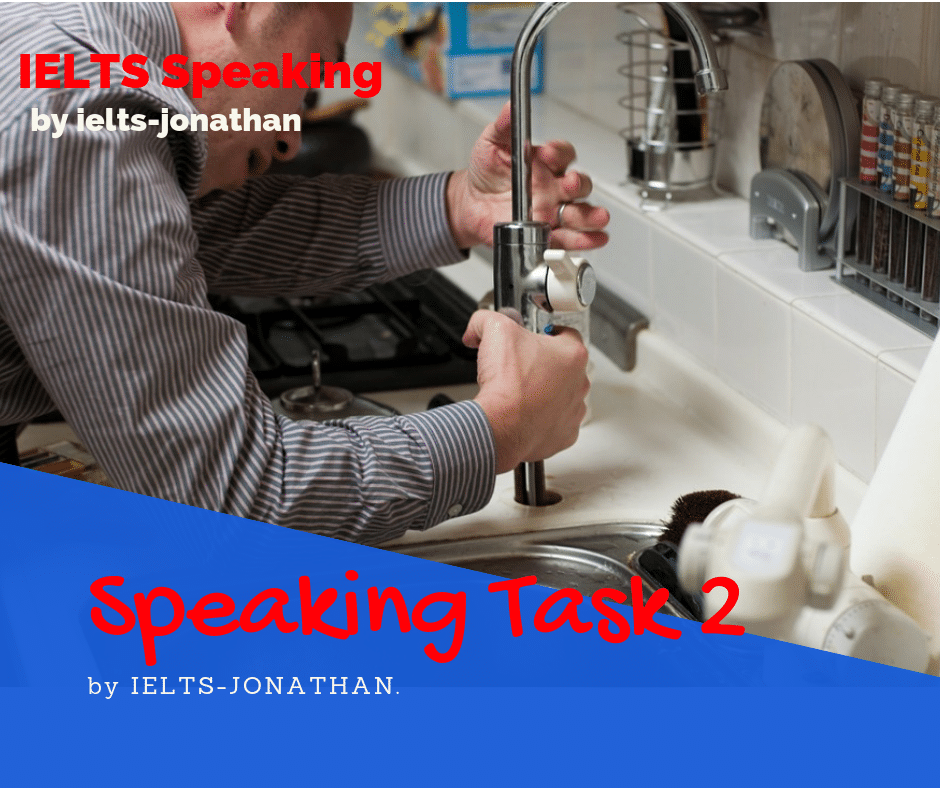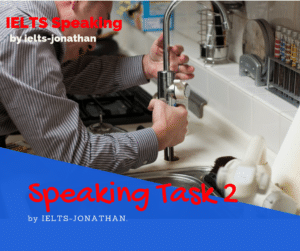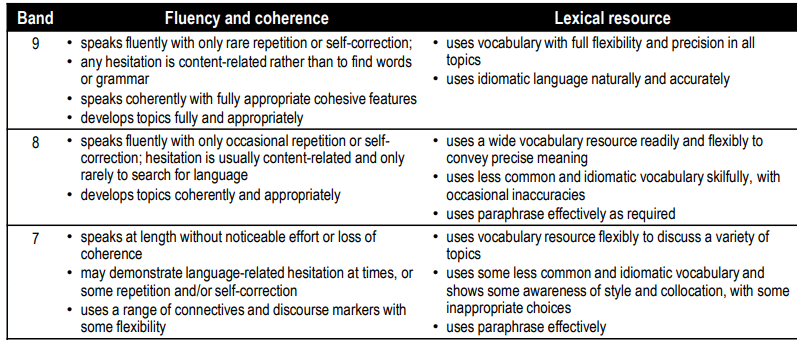Did you know that the second part of the IELTS Speaking test can be the most difficult for candidates, even Native Speakers.
But don’t despair it can also be the easiest part, and the most enjoyable.
There is a valid reason for this part of the IELTS test, and I will explain this below.
One reason for Part 2 is to allow the candidate speak at length and meet the fluency criteria.
A second reason is to allow the examiner to grade your ability for the follow up questions in Part 3.
They are trained to listen carefully for language range, grammar accuracy and pronunciation is normal speech.
They can then chose the best question sets in Part 3 that allows you to display your real language ability. So it’s important to fill that 2 minutes the best you can.
Part 2 Structure
You are given a set of prompts and a question.
The prompts are not particularly challenging, but follow a pattern to give you ‘ideas’ and ‘structure’ for your 2 minute talk.
This gives the examiner ‘a further opinion‘ to your level, ready for Part 3.
One way to do well in this section is to try and relax.
A relaxed candidate always performs better and responds well.
If you don’t understand something, always ask the examiner to repeat the prompt question.
The examiner can’t help you directly, but repetition might help you understand the prompt better.
Other tips are
- Don’t give the examiner an opportunity to ask ‘can you say anything else about that’.
- Speak for the full 2 minutes until the examiner stops you.
- Don’t hesitate too much, you are allowed to make some mistakes, it’s natural.
- Connect your sentences and use the structure given in the prompt.
- Attempt to use complex sentences rather than short, simply ones.
and
- Don’t be afraid to correct yourself.
What if you really don’t understand the prompt or even worse the prompt doesn’t apply to you?
If you’re preparing for IELTS, and feel you cannot answer some of the speaking questions properly, simply because they really do not apply to your current life experience, then don’t worry as you’re not alone.
For example:
Q. Talk about an object you own that is especially valuable or important to you.
Problem: I have a quite spartan lifestyle and I don’t have any emotional attachment to any objects I own.
Q. Talk about an object that has had great influence in your life, and explain how it influenced your life.
Problem: While I could talk for hours about books that I love, I don’t really feel that there is a book that has truly influenced my life.
IELTS Speaking Topic: Waiting for someone
Describe an occasion where you received good service from a company or shop.
You should say:
what the service was
when and where you received the service
whom you were together with
and explain why you think it was a good service
One day in April, the machine could not boot up without issuing a warning. I tried various methods but couldn’t solve the problem, so I decided to take it to the nearest Apple Store which was in Cambridge.
This shop had only been open for a short while and it was quite spacious and there were’t many people there. A sales assistant took my personal computer, and checked it thoroughly. He politely asked several questions about how long the Mac had been faulty, and what I was doing the last time the computer was working.
After a while, the assistant advised me that the hardware of the machine was ok but there was a software issue. The best suggestion he could come up with was that the operating system would need to be reinstalled but the consequence of this would be that any data or files on the computer would be erased.
Fortunately, most of my important files are cloud based so after I agreed, the assistant immediately began the installation process to the latest operating system. Several minutes later, the Mac rebooted and seemed to be working fine
I was quite satisfied with the service provided as he was obviously well-trained, and he was quite pleasant to deal with. He was also patient and seemed to know what he was talking about, so that I would probably go back to this store again.
Solution to this problem
IELTS is a test of your language ability, not intelligence or knowledge.
You may think the IELTS test is an interrogation, but you don’t really need to answer with the truth.
However, I would feel more comfortable with the be honest approach, even if it does not directly answer the question.
You would probably be able to answer more naturally, and therefore be more fluent.
Which one do you think is a better strategy?
You can use tips and information on this website to help make it easier to obtain a higher score, but remember you still need to work at learning the language to be successful.
Please share to someone you know and in the meantime take a look at my Facebook Page and Website for IELTS answers and you can also join my Facebook Group here too.
Good Luck
Jonathan
I’m Jonathan
I’ve taught IELTS and University English in more than a dozen universities and schools around the world.
I’m a parent, traveller and passionate about language teaching and helping students achieve their dreams.
Whilst living in Austria or working in Asia, I run IELTS courses to help students get to where they want to be.
If you are serious about IELTS, connect with me to see how I can help you.























